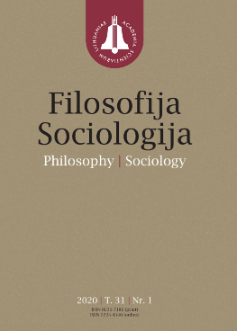Martin Buber’s Dialogical Communication: Life as an Existential Dialogue
Martin Buber’s Dialogical Communication: Life as an Existential Dialogue
Author(s): Vytis Valatka, Vaida AsakavičiūtėSubject(s): Philosophy, Communication studies
Published by: Lietuvos mokslų akademijos leidykla
Keywords: Buber; dialogic communication; dialogue; monologue; existence; relation I–Thou and I–It;
Summary/Abstract: On the basis of Martin Buber’s philosophy, the article analyses the links between the dialogue and human existence. In the beginning of the first part, the definition of Buberian dialogue is analysed from the perspective of relation. This perspective shows that primary relations may be of twofold character because there is a constant fight between the two I and It. This shows that human existence is not static and undergoes a gradual development. It is also under constant evolvement and faces a choice. Consumer society and mass media are said to contribute to gradual establishment of the relation I–It, which results in a loss of direct interpersonal communication. In the second part of the article on the basis of the opposition between the dialogue and monologue, different ways of human existence are discussed. The opinion that a dialogic relation is a means for an individual to ascend from the inauthentic to authentic dimension of existence is substantiated. Thus, approaching a dialogue from the perspective of Buber’s dialogic communication, it does not have a well-defined structure or any universal models. It is the experience lived through in an intuitive and unique way. In this respect, the dialogue remains the goal and mystery of person’s existential life.
Journal: Filosofija. Sociologija
- Issue Year: 31/2020
- Issue No: 1
- Page Range: 51-60
- Page Count: 10
- Language: English

